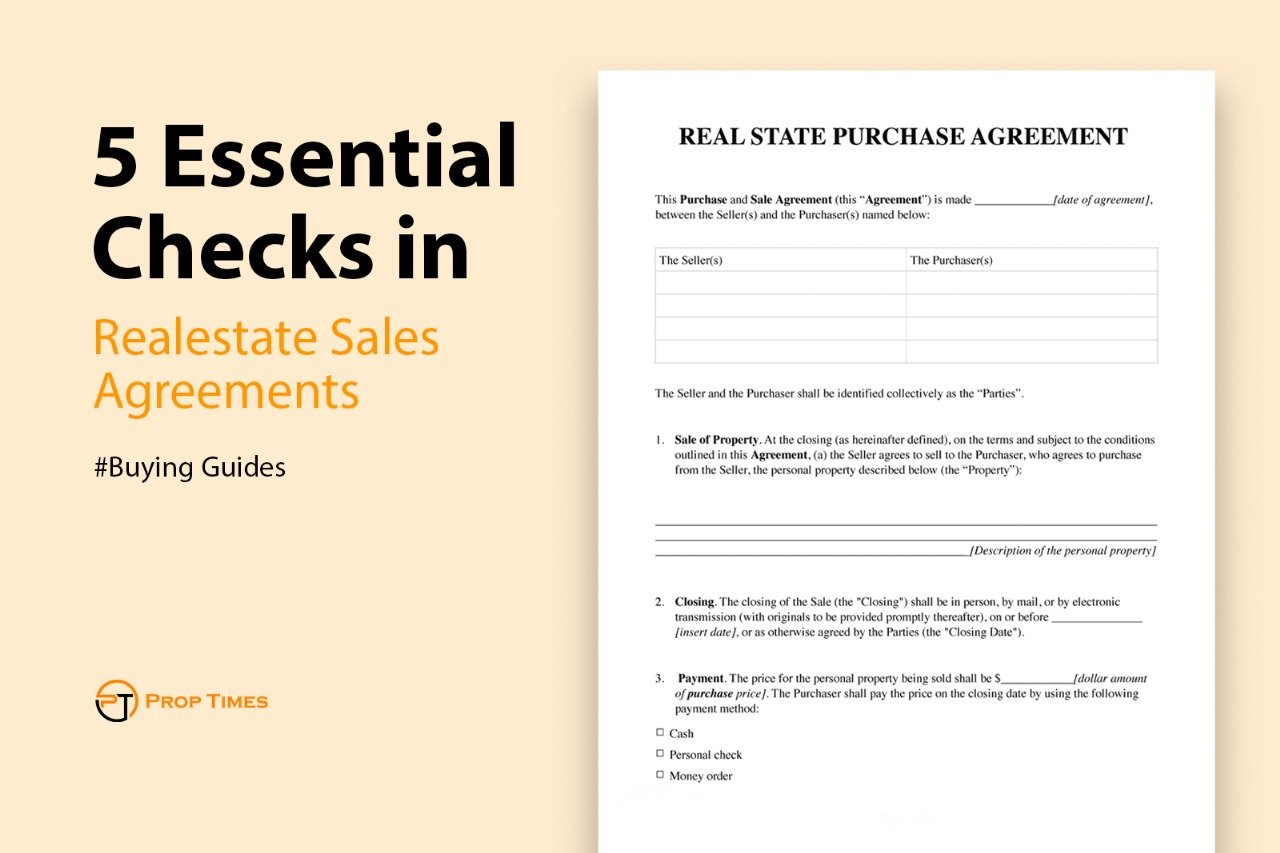
5 Essential Checks in Real estate Sales Agreements
Starting the journey towards property ownership in India can be an ambitious venture, and understanding your realestate sales agreement is paramount to its success. Not just a formality; this document protects both buyer’s and seller’s interests by setting out what should happen during transactions between buyers and sellers.
Understanding its nuances is vital for smooth transactions – this guide offers five checks to make sure it aligns with expectations as well as legal requirements to guarantee a trouble-free property purchase journey.
1. Introduction of Real Estate Sales Agreement
A Real estate sales agreement is a legally-binding document between buyer and seller that specifies the terms of property sale. This may include property description, sale price, payment terms and any contingencies upon which its sale depends.
As negotiations surrounding property transactions in India can often become contentious, understanding all of this agreement’s facets is critical for safe transaction outcomes.
2. Essential Check #1: Accurate Property Description
To ensure an accurate property description, the document should accurately detail address, dimensions and legal identifiers pertaining to a given property. Any discrepancies could lead to disputes; ensure its description matches what’s happening on-site if part of larger building. Also make sure that ownership boundaries (including shared areas) are clearly delineated within.

3. Essential Check #2: Sale Price and Payment Terms
At the core of every agreement lies its sale price and payment terms. Your contract should clearly state these elements; including total price, payment schedule (including any advance payments and due date for final payment), advance payments made towards final payments due date as well as advance payments that align with your financial capacity and any clauses which could alter it under certain conditions.
4. Essential Check #3: Contingencies for a Safe Purchase
Buyer protection may include property inspections, financing arrangements and legal clearances that provide them with an exit route or negotiation leverage if any issues arise during their purchase agreement.
These should all be explicitly included as provisions within their purchase contract agreement to allow an escape route in case anything arises during negotiations that could impact them negatively.
5. Essential Check #4: Closing Costs and Who Bears Them
Closing Costs and Who Is Paying Its It is imperative to establish who will bear closing costs. In India, typically these costs are covered by the buyer; however, any or all may be negotiated to be covered by the seller instead. Understand what expenses should be expected and negotiate accordingly.
6. Essential Check #5: Closing Date and Possession Details
The agreement should include details on closing and possession dates. In case the seller does not vacate by these dates, be sure that there are safeguards in place such as penalties or the option to cancel.

Navigating Legal Jargon
Real estate contracts contain numerous legal terms. Don’t be intimidated to reach out for clarification from an experienced legal professional on such terms as “encumbrances”, “lien”, and “indemnity”, so as to fully comprehend your agreement.
Real Estate Professionals
Tap the expertise of agents, lawyers and inspectors when buying or selling real estate. Agents can negotiate favorable terms while lawyers ensure legality while inspectors identify potential property issues.
FAQs Regarding Real Estate Sales Agreements
Address discrepancies immediately by requesting document revision to reflect accurately
your property details.
Once signed, sale prices tend to remain static; however, contingent clauses may allow for
some form of negotiation.
When conducting any transaction, be sure to include inspection, financing, and legal clearance contingencies as a safeguard in the deal.
While negotiations can often shift costs to the seller, who typically pays all costs involved with buying.
Any contract should include safeguards to protect both parties, such as penalties or sale cancellation options.
Conclusion
Understanding and reviewing your real estate sales agreement in India is vital for a smooth
transaction. By undertaking thorough due diligence and seeking professional assistance, you
can navigate this complex process and ensure your property purchase is both successful and
safe. Consider this agreement your shield – detailing every aspect of the sale to protect both
investment and future plans.
Can't Find What you are looking for?
Tell us about your choice here!









